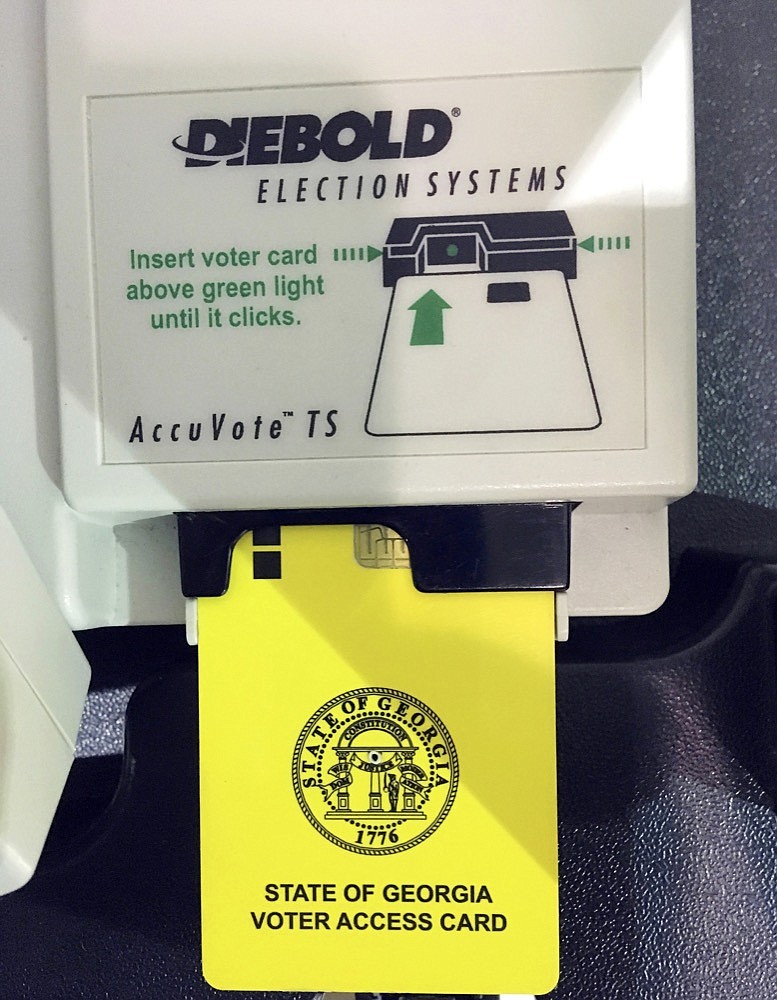ATLANTA (AP) - Georgia voters could soon get new electronic touchscreen voting machines that print a paper ballot under fast-moving legislation approved Thursday by a House subcommittee and then by the full committee.
The full committee vote split 13 to 6 along party lines, with Republicans in support.
Nearly seven hours of public testimony preceding the votes was at times raucous, with a packed room of citizens and activists often cheering or hissing at speakers, and the chairman pausing proceedings several times.
The proposal comes three months after a highly contentious race for Georgia governor between Democrat Stacey Abrams and Republican Gov. Brian Kemp, the winner. Issues including long voter lines, reports of malfunctioning voting machines, and high rates of rejected absentee ballots shook voter confidence and cast national attention on the race.
The bill's author, Republican state Rep. Barry Fleming of Harlem, said he believed electronic ballot markers better captured voter intent, citing the possibility of stray marks throwing off tabulation of hand-marked paper ballots. Fleming also said electronic ballot markers are the only real way to accommodate all Georgians, including disabled voters, with one system.
But cybersecurity experts, voting integrity activists and many concerned citizens favor hand-marked paper ballots.
Systems using electronic ballot markers include touchscreen computers where voters make their selections, then print a paper ballot that's counted after being scanned. Setups from different vendors vary, but voter selections can either be spelled out in human-readable form, encoded in a barcode or both.
Hand-marked paper ballots are simply ballots filled out with pen on paper.
Initial cost estimates approach $150 million for electronic ballot markers, the same amount included in bond funding in Kemp's 2020 budget proposal. Initial costs for hand-marked paper ballots approach $30 million.
Georgia Tech computing professor Richard DeMillo testified Wednesday that hand-marked paper ballots were the most secure option.
DeMillo, along with 23 other cybersecurity experts around the country, sent a letter to lawmakers urging for hand-marked paper ballots in January. He disputed Fleming's claim that electronic ballot markers better capture voter intent.
"What we're concerned with is that some unobservable piece of technology will get between ... an intention in the voter's mind and the indelible transfer of that intention to a piece of paper. That is where the hack occurs," DeMillo said. "A hand marked paper ballot imposes no intermediate technology. What you see is literally the best evidence of voter intent."
Election officials from two of Georgia's most populous counties, Fulton and Cobb in the Atlanta metro area - favor electronic ballot markers.
Fulton County board of elections director Richard Barron and Cobb County board of elections director Janine Eveler said recently that electronic ballot markers would be the easiest and most cost effective for counties to administer, citing printing and storage costs of a paper ballot system.
Some propoponents of hand-marked paper ballots project they would actually save counties on ongoing operating costs.
The wide-ranging legislation also would tweak the state's strict standard for verifying voter registrations and clarify when polling places can be closed or moved, measures proposed earlier by Democrats.
During Thursday's meeting of the full House Governmental affairs committee, House minority leader Bob Trammell, a Luthersville Democrat, asked why the bill couldn't be broken up. Trammell said Democrats support many parts, but are against the electronic ballot markers.
"Well Mr. Trammell, I'm trying to get you to vote for the bill," Fleming said, acknowledging the package sought to sway Democrats into accepting the voting machines.
Fulton County voter Stacey Hopkins said earlier this week that she liked some of the proposed changes in the legislation "except for the machines." She said people had lost trust in the election system and officials who ran it.
A federal lawsuit filed by election security advocates and individual voters that challenges Georgia's use of paperless electronic voting machines remains pending. A letter sent Monday by Bruce Brown, a lawyer representing the plaintiffs, to lawyers for the state says the electronic ballot-marking machines authorized by the bill "will not provide secure or auditable elections or resolve the issues raised in the litigation."
Trammell tried several times to enter amendments to the Republican-drafted bill.
One that was voted down Thursday morning stipulated that scanners tabulate only human readable marks, meaning a voter's selections couldn't be encoded in a barcode.
Republican Rep. Shaw Blackmon of Bonaire later entered an amendment that the paper ballot must contain human-readable text that spells out a voter's selections. The amendment was accepted.
Trammell told the full committee the difference between the two amendments centered on what was actually being tabulated. Under his amendment, only human-verifiable text would be able to be tabulated. But Shaw's amendment allows a barcode to be what's actually tabulated, so long as the paper ballot also contained human-readable text selections.
The legislation could quickly move to the full House next for a vote.
